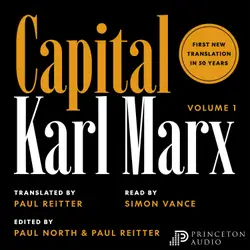In "The Eighteenth Brumaire of Louis Bonaparte," Karl Marx offers a profound analysis of the political upheaval in France during the 1850s, particularly the rise of Louis Bonaparte after the 1848 revolution. Employing a blend of historical materialism and incisive political critique, Marx examines the interplay between class struggle and political power, articulating how varying social strata interact with nascent authoritarianism. The work is not merely a historical account; it is a rich commentary on the cyclical nature of history, foregrounding the concept that 'all great world-historic facts and personages appear, so to speak, twice.' Its literary style is marked by sharp irony and rigorous analysis, situating it within the broader context of Marxist theory and its critiques of modern politics. Karl Marx, a revolutionary thinker and co-author of the "Communist Manifesto," penned this influential work drawing from his deep engagement with the socio-political realities of his time. His interest in class dynamics and revolutionary movements informs the narrative structure of the book, aligning with his overarching philosophy on the role of the proletariat in historical transformation. The tumultuous socio-political landscape of mid-19th century France provided a fertile ground for Marx's exploration of the relationship between individual agency and historical determinism. For scholars, students, and anyone intrigued by the interrelations of politics and society, "The Eighteenth Brumaire of Louis Bonaparte" is essential reading. It not only illuminates the historically contingent nature of political power but also evokes timeless questions about authority and resistance. This book remains a crucial text for understanding the complexities of revolution and the dynamics of class struggle, making it indispensable for contemporary discussions on democracy and power.
The Eighteenth Brumaire of Louis Bonaparte
Begin je gratis proefperiode van 30 dagen
- Volledige toegang tot honderdduizenden luisterboeken en e-books in onze bibliotheek
- Maak tot 4 profielen aan, inclusief kinderprofielen
- Lees en luister offline
- Abonnementen vanaf € 7,99 per maand

The Eighteenth Brumaire of Louis Bonaparte
In "The Eighteenth Brumaire of Louis Bonaparte," Karl Marx offers a profound analysis of the political upheaval in France during the 1850s, particularly the rise of Louis Bonaparte after the 1848 revolution. Employing a blend of historical materialism and incisive political critique, Marx examines the interplay between class struggle and political power, articulating how varying social strata interact with nascent authoritarianism. The work is not merely a historical account; it is a rich commentary on the cyclical nature of history, foregrounding the concept that 'all great world-historic facts and personages appear, so to speak, twice.' Its literary style is marked by sharp irony and rigorous analysis, situating it within the broader context of Marxist theory and its critiques of modern politics. Karl Marx, a revolutionary thinker and co-author of the "Communist Manifesto," penned this influential work drawing from his deep engagement with the socio-political realities of his time. His interest in class dynamics and revolutionary movements informs the narrative structure of the book, aligning with his overarching philosophy on the role of the proletariat in historical transformation. The tumultuous socio-political landscape of mid-19th century France provided a fertile ground for Marx's exploration of the relationship between individual agency and historical determinism. For scholars, students, and anyone intrigued by the interrelations of politics and society, "The Eighteenth Brumaire of Louis Bonaparte" is essential reading. It not only illuminates the historically contingent nature of political power but also evokes timeless questions about authority and resistance. This book remains a crucial text for understanding the complexities of revolution and the dynamics of class struggle, making it indispensable for contemporary discussions on democracy and power.

The Communist Manifesto: 1888 Translated Edition (The Political Classic of Karl Marx And Friedrich Engels) :
Karl Marx, Friedrich Engels, Samuel Moore
audiobook
The Communist Manifesto : Karl Marx & Friedrich Engels' Revolutionary Call
Friedrich Engels, Karl Marx, Zenith Horizon Publishing
book
Het Communistisch Manifest : .. in de 21e eeuw
Karl Marx, Friedrich Engels, Hannah van Binsbergen
audiobook
Wage Labour and Capital :
Karl Marx
audiobook
Capital : Critique of Political Economy, Volume 1
Karl Marx
audiobook
15+ Political Science. Classics Collection : The Art of War, Tao Te Ching, The Republic, Meditations, The Prince, Utopia, Utilitarianism, Anarchism and others
Sun Tzu, Lao Tzu, Plato, Marcus Aurelius, Niccolo Machiavelli, Thomas More, Tommaso Campanella, Francis Bacon, Thomas Paine, John Stuart Mill, Karl Marx, Friedrich Engels, Vladimir Lenin, Rosa Luxemburg, Peter Kropotkin, Emma Goldman, Leon Trotsky
audiobook
The Capital (Vol. 1-3) : Including The Communist Manifesto, Wage-Labour and Capital, & Wages, Price and Profit
Karl Marx
book
Het communistisch manifest
Friedrich Engels, Karl Marx
book
The Communist Manifesto
Karl Marx, Friedrich Engels
audiobookbook
Capital : Volume 3: A Critique of Political Economy
Karl Marx
audiobook
Capital : Volume 2: A Critique of Political Economy
Karl Marx
audiobook
Capital : Volume 1: A Critique of Political Economy
Karl Marx
audiobook